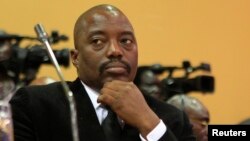Democratic Republic of Congo's highest court on Tuesday told election authorities to take a fresh look at the country's voting timetable, raising the prospect of a delay that would enable President Joseph Kabila to stay in office beyond 2016.
The court ordered the national election commission to re-evaluate its calendar, saying that budgetary and political constraints had made it untenable.
Critics say Kabila intends to hold on beyond the election set for November 2016, when he is due to step down, and delay the first peaceful handover of power in a country whose eastern regions have endured years of conflict.
At least 40 people were killed in January in protests over a plan to revise the electoral code. Kabila has ruled Congo since his father's assassination in 2001, and he won disputed elections in 2006 and 2011.
Analysts say the 2016 timetable for more than a dozen local, provincial and national elections is in jeopardy because of the $1.1 billion price tag and difficulties establishing 21 new provinces created in July as part of a decentralization initiative.
The court said this process, in which the new provinces have yet to establish executive committees, had created "anarchy" in the absence of viable local governance.
The court "orders the National Independent Electoral Commission to evaluate, in complete independence and impartiality, the entire electoral process," its president, Luamba Bindu, said from the bench.
Governors must be in place before polls for new provincial assemblies, now set for Oct. 25 this year, can occur, he said. A postponement of that vote could delay the whole timetable.
The court also ordered the government to take "exceptional transitional measures" to restore order and security in the new provinces and accelerate the elections.
That order could be interpreted as allowing the government to appoint interim governors, but government spokesman Lambert Mende said it was too early to say how Kabila might respond.
Kabila's opponents say they suspect that by naming governors he can install loyalists to help him stay in office.
Kabila has refused to comment on his political future, though Mende said he would respect the constitution.





